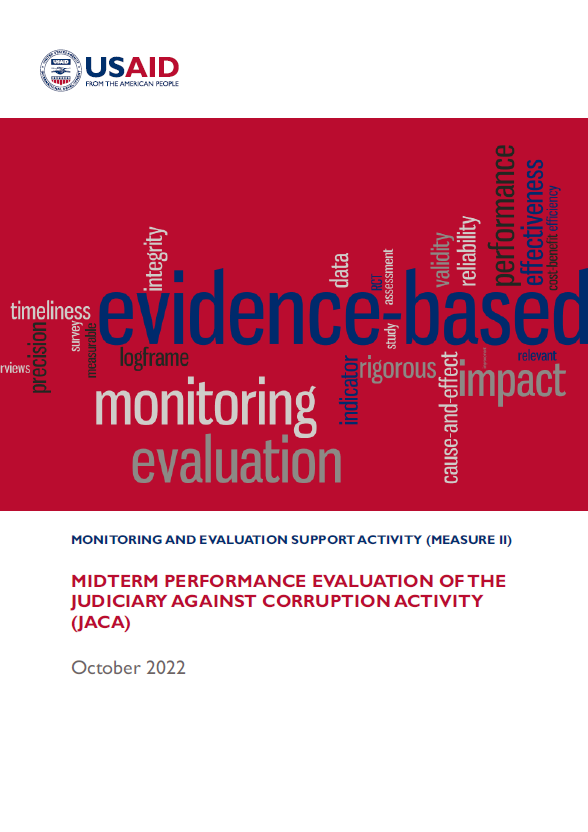
Mid-Term Performance Evaluation – JACA
|
The Monitoring and Evaluation Support Activity (MEASURE II) conducted a mid-term performance evaluation of USAID’s Judiciary Against Corruption Activity (JACA), a $7.9 million, 5-year Activity launched in 2019 and implemented by Development Professionals, Inc. (DPI). JACA provides policy, institutional capacity, and legislative assistance aiming to strengthen the BiH judiciary’s ability to successfully deal with high-level corruption and organized crime (HCOC) cases. The performance evaluation focused on the Activity’s design and progress toward expected results to support the Mission and the implementing partner (IP) in making informed programmatic decisions about any potential midterm corrective actions in the Activity design and implementation arrangements. The evaluation covered the following questions: 1. What primary factors have contributed to the success of or presented specific challenges in JACA implementation when it comes to improved adjudication of high-profile corruption and organized crime cases? 2. What primary factors have contributed to the success or presented specific challenges in JACA implementation when it comes to prevention of corrupt behavior in the justice sector? 3. Is there room for adjustments in providing JACA’s technical assistance to partner institutions, e.g., for starting to provide support to new partner institutions and/or withdrawing support from some of the current ones, and why? 3.1. To what extent does JACA have the same commitment to the implementation of its intervention from the management/prosecutors/judges of initially selected partner institutions (POs and courts) for processing/adjudication of HCOC cases and the HJPC for Component 2 interventions?
|
|
4. What are the needs of the beneficiaries in adjusting the current lecturer/trainer selection model, if any? 4.1. What lecturer/trainer selection model does JACA apply? 4.2. What is the beneficiaries’ assessment of the model currently in use? 5. In what ways could cooperation/collaboration with other USAID efforts and programs be more effective? The evaluation employed a mixed-method data collection approach and triangulated data from the following sources: • Review of Activity documents and secondary documentation relevant to the anti-corruption topics. • Key informant interviews with 26 participants, including JACA’s partner POs/prosecutors, courts/judges, the HJPC and its bodies, and international organizations. • Six focus groups with 20 JACA beneficiaries. • HJPC administrative data and JACA survey data covering progress in processing HCOC cases and perceptions of the HCOC prosecutors related to processing of HCOC cases. • Observation of four JACA-organized training events. The final evaluation report may be accessed at the link below. (click on the image to download the file) |





